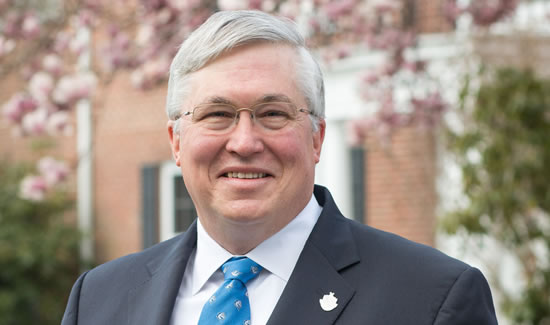EXCLUSIVE INTERVIEW
President Tim Hall, Mercy College
By Joan Baum, Ph.D.

With a summa cum laude B.A. in philosophy and graduate work in religious studies, perhaps it was inevitable that Timothy L. Hall, the 12th president for the last six months of Mercy College in Dobbs Ferry NY, would invoke the words of the prominent Anglican scholar John Henry (Cardinal) Newman, to describe the philosophy behind his own Idea of a University as “an Alma Mater, knowing her children one by one, not a foundry, or a mint, or a treadmill.” He brings to his new position, however, not just philosophical ideas but broad and deep practical experience in the academic world as a chief administrator, not to mention significant expertise as a legal scholar. Factor in as well affability and a sense of humor: “How can one not be a lawyer these days!” During his tenure as president of Austin Peay State University in Clarksville, TN, where he noticeably increased enrollment and funding, he attracted national attention for his innovations in effecting student success. Indeed, one accomplishment, the institution of a “degree-compass program” designed by a colleague at Peay called Desire to Learn, will be marketed in the spring, though it has already been the subject of major articles and notice by the U.S. Department of Education. Using technology creatively, the performance-based program advises students in a way the president analogizes to how Netflix chooses movies, Pandora, music and Amazon books; i.e., looking at a wealth of data and suggesting what students might choose as coursework. Among personal and comparative considerations are the success rates of other students, SAT scores, overall academic background and other indicators. The program, President Hall says, has a “high degree of accuracy” but should not be viewed as prescriptive. It’s designed to give students suggestions about what to study that will lead to success.
“Success,” of course, is a fluid term, subject to and reflecting local and national conditions. The years 2002-2011, the president notes, were growth years in enrollment (a 32 percent increase) but that since then, due to financial pressures and smaller high school graduation, there’s been a turndown. He’s undeterred, nonetheless, in going for both access and excellence. “We’re in a fight against tuition increases,” he says, pointing to the fact that Mercy has been cited recently as one of the most affordable private colleges in the country, with an average cost of $17,000 a year. But the breakdown for Pell eligible students who come from New York State (the majority of Mercy enrollees) is even more impressive. Between federal aid and what Mercy itself provides to low-income students, often the first in their family to go to college, the gap for the student is $1100.
Such assistance may well help improve retention and graduation rates, a continuing problem for many colleges across the country. Success in these areas, however, should take into account demographics, of “tremendous importance” in assessing how students do and what success rates mean. Approximately 70 percent of Mercy freshmen are Pell eligible, and the graduation rate, typically six years, hovers at 36 percent. He feels confident, however, that Desire to Learn and PACT (Personal Achievement Contract) will make the difference, the latter a tailor-made, individual advisement program that covers all manner of counseling – academic, financial, psychological, career. He’s also “obsessive” about good teaching, hiring and retaining faculty “who can personally connect with their students.”
Like many institutions of higher education, Mercy is recruiting students from other countries (20 this year from Scandinavia and opening up in China), thus diversifying the campus with international presence. The president is also pleased to note that most graduates tend to stay in the area, contributing their learning to the community, especially in the more popular disciplines of health sciences, education and business. In that regard, President Hall hopes for even more success, with students being “great students and great citizens.” #
